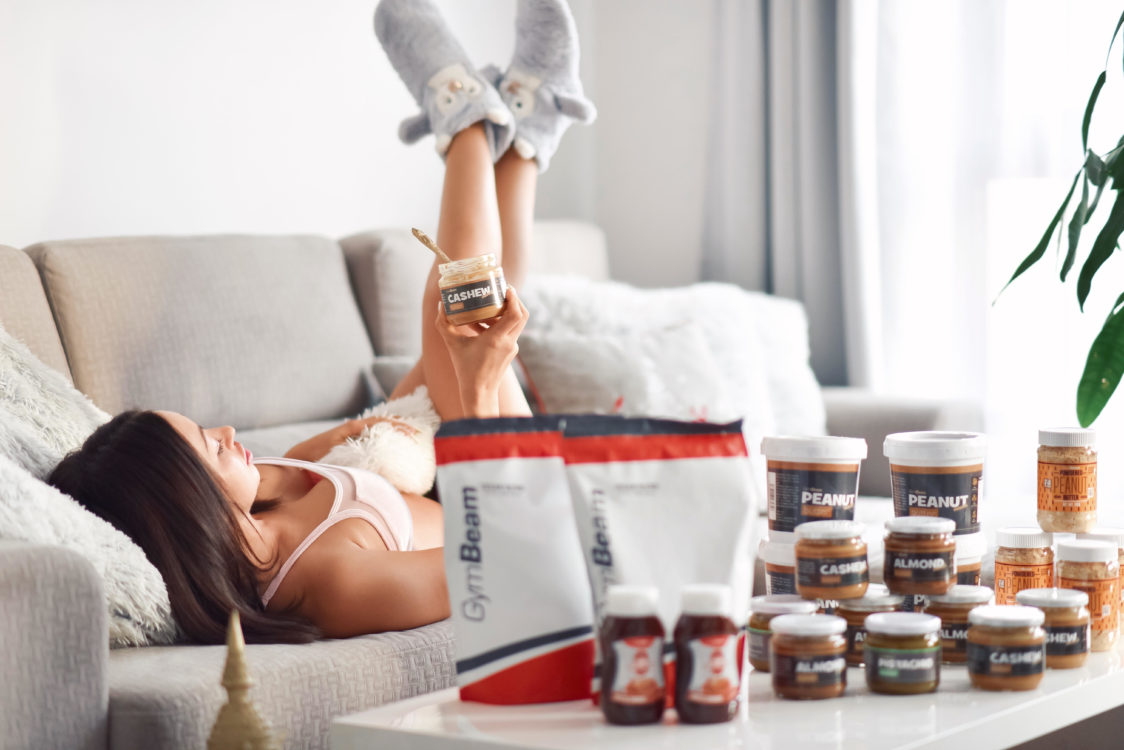Table of Contents
Maybe sometime during October, thanks to the reappearing Christmas decorations in shopping malls, on the streets and in TV commercials, you were able to detect that Christmas is approaching. Apart from asking yourself how it is possible that time flies like that and Christmas is here again, you may also have started thinking about how to handle Christmas feasting this year without gaining way too many inches in the circumference of your waist.
Although you probably forgot about it, while you were thinking about what to give to your loved ones and how to gently suggest to them that you already have a decent supply of socks and Christmas jumpers, and this year it would be nice to get something different. But with the holidays approaching, your worries about gaining weight may increase again, and you wonder if it’s really possible to gain the 10 pounds of fat just during Christmas, like everyone else is saying.
How many pounds do people actually gain on average during Christmas?
So, what about those 10 extra pounds of fat after Christmas, is it real? Each holiday season is characterized by good food, drinks, visiting family, friends and exercising less. Christmas is an example of a holiday when you can gain weight easily. A number of studies show that don’t have to be afraid of gaining impossible 10 pounds of fat after the Christmas feast. In the modern western world, people gain on average less than 1-2 pounds or 1% of their body weight during Christmas. [1–5]
Does this mean that you are fine and can spend Christmas in the style of “All You Can Eat and Drink”, watching Christmas films and gaining only a pound? Definitely not. If you approach Christmas in such a Bohemian way and enjoy it from December 24 until New Year’s Eve, then the increase in fat will be more noticeable.
Let’s take a look at John’s routine over Christmas:
- John read on the internet that around Christmas he should rest, take it easy and relax.
- He takes it seriously and eats 5,000 kcal every day from Christmas Day to New Year’s Eve.
- That is 40,000 kcal in 8 days. And since John is a bigger gentleman, he burns about 2,000 kcal per day being in, let’s say, economical mode, which means that in 8 days he is in a caloric surplus of 24,000 kcal.
- Excess energy has to be stored somewhere, where will it be? That’s right, it will store as fat. If we take into account that one pound of fat has an average of 3,500 kcal, it turns out that Jirka would gain about 6.6 pounds of fat.
That doesn’t sound as ‘just a little bit’, does it? When John found out about this, he said to himself that he would be just a little careful about the food, he would not overeat and at least, he would go for a walk and play some ice-hockey with his friends. [6]

What are the most common approaches to eating around Christmas among people?
As you may have noticed on John’s example, there are countless advice and recommendations on the Internet and on social networks on how to approach Christmas time from the point of view of nutrition, rest and training. From the inexhaustible amount of information and approaches, you can easily get confused. What group do you fall into?
- “I will enjoy Christmas with everything. I will sample, eat and drink everything I come across while watching Holiday movies. I’ll lose the weight a few weeks after Christmas.”
- “I’ll watch the portion sizes a bit, but I will enjoy Christmas time to the fullest.”
- “I’ll sample a little of everything, I’ll try not to eat too much and won’t eat calorie bombs unnecessarily.”
- “I plan to sample a thing here and there, prepare healthier and less calorie versions of Christmas delicacies, and lighten heavy meals.”
- “No break for me. Even at Christmas I will write food to MyFitnessPal and I will keep my healthy diet and training.”
Is any of this wrong or right? Basically, it is not. But you have to really evaluate what is in your power and what is not.
- Are you an enthusiastic athlete and you work out all year round and take a break during Christmas, when you gain couple of pounds of fat, but then get rid of them easily before the month of January is over?
- Are you an athlete and an active person who really struggles to return to healthy habits and is struggling all January to return to healthier lifestyle paths?
- Are you not very active and still struggling with those pounds you gained around Christmas 2015?
Simply be aware of all aspects of your personality, approach any holiday with common sense and avoid extremes. From an overall lifestyle perspective, it is much more important how you live all year, and not just a few days at the end of the year. Christmas is a holiday of peace and quiet, family happiness and good food, but not too much of it. Relax, take care of your loved ones and try to think about how you are doing with your eating and healthy lifestyle habits. Are you an absolute pro, or do you see room for improvement? Try to write in your new diary what you would like to improve, break this goal into a few smaller steps, on which you will start working gradually, and next year you will be on a next level again.

What do you think will happen, and what will really happen to your body over Christmas?
If you are worried about your body and shape, you are probably one of the active athletes who work out all year round and think about what they eat. Or maybe you’re just trying to eat healthy, and you wonder why you usually gain an extra 5 pounds after Christmas. Don’t worry, most likely it’s not fat. How is it possible?
What do those extra pounds on the scale really mean?
As we showed in John’s model example above, in order to gain two pounds of fat, you would have to take 7,000 kcal beyond your needs. Which is quite a lot, and in 8 days between Christmas Day and New Year’s Eve, it would mean a daily energy surplus of just under 1,000 kcal. If you think a little about what you eat during Christmas and don’t forget to move, you will most likely not consume that much extra calories.
So, why does the scale say that you gained some extra weight?
- More body water. After Christmas, when you eat a wide variety of foods, you have a little more body water due to the amount of salt and carbohydrates in your diet.
- Glycogen stores at maximum capacity. A period of rest, plenty of food and sources of carbohydrates result in “having a full carbohydrate tank” in the form of glycogen, which the average person has about 450 grams. And each gram of glycogen binds about 3 grams of water, which can make just over 4 pounds of difference compared to depleted glycogen stores. [7]
- Amount of digestive work. Each meal weighs something, and the normal time for the food to pass completely through the digestive system is estimated to be between 40-60 hours. It will take a few days for this condition to go back to normal once you return to your regular lifestyle. [8]
- Different weighing time and conditions. Different conditions and weighing time always give skewed results. Therefore, always weigh yourself at the same time of day and under the same conditions, ideally after doing your morning routine.
- You are a woman and your body weight changes naturally during your menstrual cycle. Therefore, note that the retention of body water due to hormonal changes reaches its highest values on the first day of menstruation. Body weight returns to normal within a few days. [9]
As you can see, there are many reasons why your scale may show a few extra pounds. So, you don’t have to panic right away and reach for the detox programme, which, and I hope you know this, won’t solve anything anyway. If you are interested in other reasons why your scale may show you extra pounds without gaining any fat, read our article Why Does the Scale Show You a Higher Number, and It Is Not Fat?

10 tips on how not to gain weight during Christmas and make your energy-packed holiday feast lighter
No matter on which side you are, the following tips may come in handy when you want to lighten your meal, “boost digestion” or at least pay more attention to what you eat.
1. Do not eat unnecessarily large portions

We don’t have to lie to each other, during Christmas, holiday food is usually very caloric. We should be aware of that and act accordingly. For example, 100 grams of classic potato salad has about 200 kcal. And when you take a really generous portion, it’s no problem to eat four times as much with 800 kcal on your plate.
The same goes for other traditional Christmas delicacies, such as fried carp, roast duck, goose, stuffed turkey, pork made in a thousand different ways, including popular fried schnitzels in breadcrumbs, Christmas brioche bread, fish soup or popular Christmas drinks and many other traditional Christmas dishes based on local traditions. Each country has its own specific Christmas and festive dishes. What applies to you depends on which country is your home.
To reduce portions, you can try using smaller plates or serve food only on a small part of the plate, or do not cover your whole meal with gravy. Studies show that people who normally eat larger portions gain weight more easily, unless you are a fan of intermittent fasting, and you have to eat larger portions in a controlled and deliberate manner within your eating plan and eating period. [10]
2. Limit liquid calories, they add up damn fast
Calories from sugary drinks, liqueurs, mulled wine, punches, beer and other “goodies” add up quickly. A litre of Coca-Cola contains about 450 kcal, the average beer has about 210-250 kcal and a 0.2 l glass of mulled wine has 200 kcal or more, depending on the amount of sugar used. You get the idea, right? These liquid calories can quite easily contribute to gaining weight. Likewise, alcohol contains a decent amount of calories, while it can also awaken your appetite, especially for salty and fatty foods. [11–12]
3. Have a bite, but do not eat everything on your plate, and do not eat as much when cooking and baking

You don’t have to be afraid to have a Christmas brioche bread that your grandmother bakes every Christmas for the whole family, and you also don’t have to keep your favourite sweets away from you. But you must not eat a half of Christmas brioche bread, a whole tray of biscuits or a plate of canapés, all in one go. The first bite is always the best and every other one doesn’t bring such a joyful experience. Try eating one or two pieces of vegetables for every biscuit you ate, do you still feel like having another one? [13]
To give you an idea about calories, one average 15-20 gram gingerbread has about 65-87 kcal and 100 grams of traditional Christmas brioche brad is about 300 kcal. So a sweet breakfast with two slices of Christmas brioche bread with a generous layer of butter and jam or Nutella can easily add 1,000 kcal to your energy intake. And that’s quite a lot. Can you guess how many pieces of average Christmas gingerbreads (15 g) contain the same amount of energy as a kilogram of fat? Wait for it…. 118 gingerbreads have about 7,700 kcal, which is the same as a kilogram (2.2 pounds) of fat.
We spend more time preparing food at Christmas, and because we want the food to be perfect, we also taste it more. Well, but tasting the food here and there can add up really quickly, and it can add a few hundred kcal above normal intake. What is the solution? Don’t prepare food hungry and one small bite should probably be more than enough.
If you are interested in how snacking can affect your body, read our article How Is Snacking Holding You Back from Losing Weight? 11 Easy Ways How to Get Your Eating Under Control.
4. Have protein in every meal
Of all macronutrients, protein has the greatest effect on satiety. Christmas goodies are usually rich in sugar, but you would struggle to find any protein. As an example we can again take a Christmas brioche bread with butter and jam. If you add a portion of 20-40 grams of protein to each meal, depending on your optimal daily intake, you can probably reduce your calorie intake thanks to suppressed hunger and appetite. [14 –15]
Therefore, reach for lean meat, fish, ham, dairy products, eggs, legumes or pseudo-cereals, or for high-quality protein if necessary. If you are interested in tips on protein sources, read our article 20 Foods with Which You Can Easily Add Protein to Your Diet.
You might be interested in these products:
5. Don’t forget fruits, vegetables and fiber
When it’s time for a snack, or you’re suddenly hungry, try reaching for fruit or vegetables supplemented with a portion of protein instead of another round of Christmas goodies. Thanks to fiber, fruits and vegetables support the feeling of satiety, and they also contain other valuable micronutrients. How about a piece of fruit with 0% Greek yogurt or a carrot with cucumber and hummus or ham?
When you focus on getting enough fiber in your diet, you can consume fewer calories overall, thus preventing potential weight gain. You should have about 30 grams of fiber per day. Some good sources of fiber include whole grains and cereal products, legumes, fruits, vegetables, nuts and seeds, or even psyllium. [16]
6. Learn to say no to more desserts and sweets

When you feel full after a rich holiday meal, you loosen a button on your trousers, it’s time for a dessert, and you miraculously found more space for it? Could it be the discovery of the second stomach, where only desserts go? It would be nice, but none of us has a “dessert stomach”, although it is a big mystery how can we still want to have the dessert even if we feel so full.
Set your boundaries and turn down the politely offered dessert or any extra food. You can say that you want to wait a while and then maybe you will have some. This will prevent unnecessary overeating and energy loss. You really are not obliged to eat everything that is offered to you. You are the one who determines the boundaries. And if you feel that you really can’t refuse the dessert offered, ask for the smallest possible piece just to taste or share it with someone else.
The same goes for other goodies, such as a chocolate Christmas tree decorations or any other delicacies that appear on the holiday table during Christmas. If you know that you can’t resist a particular type of treat, and you would easily eat a whole plate, hide it and leave out only one or two pieces.
7. Alcohol to be consumed only in limited amounts
Over Christmas, sweetened drinks, alcohol and other high-calorie liquids are everywhere. It is certainly not harmful to have a glass of wine or champagne, but if you drink more during the evening, you start to crave some savoury and fat food. Just as a fun example, a bottle of wine represents about 500-650 kcal, 200 ml of eggnog about 550 kcal and 200 ml of mulled wine starts at about 200 kcal. Be aware of this, and maybe you will thank yourself the next morning when everyone around you will have a hangover, and you will feel much fresher. [12]
8. Adjust your recipes for healthier alternatives
If you want to make your Christmas delicacies little lighter, here are a few tips to reduce their energy content and you don’t have to feel tired and ready for bed after consuming them.
- Replace sugar in your recipes at least partially with calorie-free erythritol, stevia or xylitol.
- When baking muffins and other delicacies, you can partially replace butter with mashed fruit (bananas) or fruit puree.
- Try using some herbs instead of butter and other fat to flavour salty foods.
- Instead of frying, choose baking, grilling or stewing.
- Maybe only partially replace fatty cream with a semi-skimmed one or low-fat milk in recipes.
- Try to make your dishes lighter with white yogurt or 0% Greek yogurt instead of mayonnaise or sour cream.
- If you like sweet carbonated drinks, try making your own with unsweetened mineral water, the calorie-free sweetener/erythritol, which occurs naturally in some fruits, fruit pieces and your favourite herbs. And almost-calorie-free refreshing drink is ready. Compared to Coca-Cola, you can save about 450 kcal per litre.

9. Get enough sleep
During the holidays, people often meet family, friends, acquaintances, while interesting shows are playing on TV, or a new series appears on Netflix, which you want to watch over Christmas. Often you stay awake until late evening, which can lead to lack of sleep. And sleep deprivation can mess with the hormones of hunger and satiety (leptin & ghrelin). So, the next day you are not only sleepy, but you are also craving some high-calorie foods that are preferably sweet, salty, fatty or ideally a combination of these flavours. To make matters worse, lack of sleep also lowers testosterone and increases cortisol levels. And perhaps none of us wants that. [17–20]
Treat yourself to about 7-9 hours of good sleep each day. It will help you get your appetites under control, you will be more energetic and have a better mood during the day. [21]
10. Stay active
During the holidays, you don’t have to lay on the couch and spend all day watching Christmas films on TV, munching on sweets. Spending all day on the couch could lead to weight gain. [22]
Take a short walk every day or go on a longer trip to discover the beauty of the nature with your loved ones or friends. If there is snow where you live, remember your childhood and go sledding, skating on the pond, skiing or build a snowman. Every step and every move counts. And the fun you will have during the snow fight is worth it, isn’t it? Simply do what you enjoy. Even a quick exercise at home counts.
Just a fun example, an average 150-pound person burns the amount of energy hidden in about 150 grams of Christmas brioche bread or 240 grams of potato salad per hour of ice skating. So put on your skates and head to a pond or an ice rink. [23]
If you are interested in how many calories you can burn with your favourite winter sports, read our article How Many Calories Do Your Favourite Winter Activities Burn?

What is the conclusion?
The average person gains about less than two pounds of body weight over Christmas, but if you think about what you eat a little and stay active at Christmas, you don’t have to worry about gaining fat. Any observed weight gain, for the most part, will be due to a larger amount of body water and energy reserves in the form of glycogen.
Christmas is a time of peace, relaxation and quality time with family and loved ones. Enjoy it according to your liking and even over Christmas, try not to forget about some healthy habits that you have worked so hard on. Christmas is a time that is meant to be with family and friends. When you look back, you will remember beautiful moments with loved ones, laughter, telling stories from all year round and good food. And not that you had a workout five times a week over Christmas. Have a beautiful Christmas, enjoy those magical moments and may all your wishes come true.
And what is your outlook on Christmas? Do you take a break from everything and enjoy the well-being and good food, or do you exercise and eat according to your best conscience even at Christmas? Share with us in the comments what is your advice and tips on how to approach the Christmas menu. If you liked the article, support it by sharing so that even your friends don’t have the unnecessary fear that they will miraculously gain a many, many pounds of fat during Christmas.
[1] Schoeller, D. A. – The effect of holiday weight gain on body weight. – https://doi.org/10.1016/j.physbeh.2014.03.018
[2] Yanovski, J. A., Yanovski, S. Z., Sovik, K. N., Nguyen, T. T., O’Neil, P. M., & Sebring, N. G. – A Prospective Study of Holiday Weight – https://doi.org/10.1056/NEJM200003233421206
[3] Díaz-Zavala, R. G., Castro-Cantú, M. F., Valencia, M. E., Álvarez-Hernández, G., Haby, M. M., & Esparza-Romero, J. – Effect of the Holiday Season on Weight Gain: A Narrative Review. – https://doi.org/10.1155/2017/2085136
[4] Helander, E. E., Wansink, B., & Chieh, A. – Weight Gain over the Holidays in Three Countries – https://doi.org/10.1056/NEJMc1602012
[5] Mason, F., Farley, A., Pallan, M., Sitch, A., Easter, C., & Daley, A. J. – Effectiveness of a brief behavioural intervention to prevent weight gain over the Christmas holiday period: Randomised controlled trial. – https://doi.org/10.1136/bmj.k4867
[6] Hall, K. D. – What is the Required Energy Deficit per unit Weight Loss? International journal of obesity – https://doi.org/10.1038/sj.ijo.0803720
[7] Kreitzman, S. N., Coxon, A. Y., & Szaz, K. F. – Glycogen storage: Illusions of easy weight loss, excessive weight regain, and distortions in estimates of body composition. – https://doi.org/10.1093/ajcn/56.1.292S
[8] Alison Parker – The Characterization of Feces and Urine: A Review of the Literature to Inform Advanced Treatment Technology – https://doi.org/10.1080/10643389.2014.1000761
[9] Colin White, Hitchcock, C. L., Vigna, Y. M., & Prior, J. C – Fluid Retention over the Menstrual Cycle: 1-Year Data from the Prospective Ovulation Cohort – https://doi.org/10.1155/2011/138451
[10] Livingstone, M. B. E., & Pourshahidi, L. K. – Portion size and obesity. – https://doi.org/10.3945/an.114.007104
[11] Malik, V. S., Schulze, M. B., & Hu, F. B. – Intake of sugar-sweetened beverages and weight gain: A systematic review. – https://www.ncbi.nlm.nih.gov/pmc/articles/PMC3210834/
[12] Yeomans, M. R., Caton, S., & Hetherington, M. M. – Alcohol and food intake. – https://doi.org/10.1097/00075197-200311000-00006
[13] Cleveland Clinic – Mindlessly Snacking (Again)? Try These Simple Mindful Eating Exercises – https://health.clevelandclinic.org/mindlessly-snacking-again-try-these-3-simple-mindful-eating-exercises/
[14] Westerterp-Plantenga, M. S., Lemmens, S. G., & Westerterp, K. R. – Dietary protein – its role in satiety, energetics, weight loss and health. – https://doi.org/10.1017/S0007114512002589
[15] Pesta, D. H., & Samuel, V. T. – A high-protein diet for reducing body fat: Mechanisms and possible caveats. – https://doi.org/10.1186/1743-7075-11-53
[16] Howarth, N. C., Saltzman, E., & Roberts, S. B. – Dietary Fiber and Weight Regulation. – https://doi.org/10.1111/j.1753-4887.2001.tb07001.x
[17] Beccuti, G., & Pannain, S. – Sleep and obesity. – https://doi.org/10.1097/MCO.0b013e3283479109
[18] Patel, S. R., & Hu, F. B. – Short sleep duration and weight gain: A systematic review. – https://doi.org/10.1038/oby.2007.118
[19] Spiegel, K., Leproult, R., L’hermite-Balériaux, M., Copinschi, G., Penev, P. D., & Van Cauter, E. – Leptin levels are dependent on sleep duration: Relationships with sympathovagal balance, carbohydrate regulation, cortisol, and thyrotropin. – https://doi.org/10.1210/jc.2004-1003
[20] Luboshitzky, R., Zabari, Z., Shen-Orr, Z., Herer, P., & Lavie, P. – Disruption of the nocturnal testosterone rhythm by sleep fragmentation in normal men. – https://doi.org/10.1210/jcem.86.3.7296
[21] Hirshkowitz, M., Whiton, K., Albert, S. M., Alessi, C., Bruni, O., DonCarlos, L., Hazen, N., Herman, J., Katz, E. S., Kheirandish-Gozal, L., Neubauer, D. N., O’Donnell, A. E., Ohayon, M., Peever, J., Rawding, R., Sachdeva, R. C., Setters, B., Vitiello, M. V., Ware, J. C., & Adams Hillard, P. J. – National Sleep Foundation’s sleep time duration recommendations: Methodology and results summary. – https://doi.org/10.1016/j.sleh.2014.12.010
[22] Hu, F. B. – Sedentary lifestyle and risk of obesity and type 2 diabetes. – https://doi.org/10.1007/s11745-003-1038-4
[23] Compendium of physical activities – https://sites.google.com/site/compendiumofphysicalactivities/Activity-Categories/winter-activtities


Add a comment